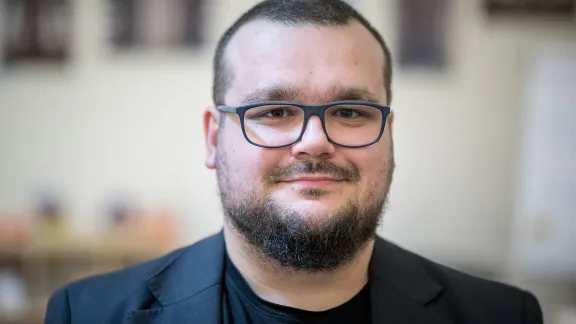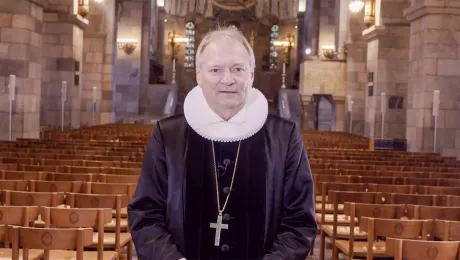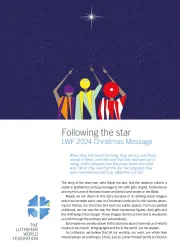The Lutheran congregation in Krakow is one of the oldest in the world. It was founded soon after the Reformation. In this Voices from the Communion, Rev. Łukasz Ostruszka speaks about his ministry in Polish society today and about living faith in a minority context.

Łukasz Ostruszka is the pastor of the Evangelical-Augsburg (Lutheran) Parish in Krakow. Photo: LWF/Albin Hillert
Voices from the Communion: Rev. Łukasz Ostruszka from the Evangelical Church of the Augsburg Confession in Poland
The Evangelical-Augsburg (Lutheran) Parish in Krakow was founded during the Lutheran Reformation and looks back on a long history. The congregation currently hosts Ukrainian refugees and the LWF Assembly Office.
Łukasz Ostruszka has been pastor of the parish since October 2021. He speaks about being church in Polish society today, welcoming Ukrainian refugees, and how the congregation prepares for the upcoming Thirteenth Assembly of The Lutheran World Federation (LWF).
Please tell us about your congregation.
We are about 700 people in our congregation. We have been here since 1557. The Reformation came to Krakow just after Martin Luther publicized his 95 theses. In medieval times, Krakow was the capital of Poland and a university city, so the Reformation spread quickly and well here.
Our first church was destroyed during the counter-reformation at the end of the 16th century. Subsequently, the Protestant church practiced its regular life outside Krakow for two centuries. Then, in 1816, municipal authorities handed over St. Martin’s Church to the Lutheran community.
Today, we are a small but very active and vibrant community. Here in Krakow, we primarily concentrate on the work with children. We have three groups during the Sunday services, and in one of them, we work with the Godly Play method, a kind of religious Montessori.
We also prioritize the work with people who want to become Lutheran. Many people wish to learn more about our faith. We are a growing community, and many people discover their spirituality in our congregation every year. That is a joyful challenge and a blessing for us.
On top of this, we have a choir, youth and student groups, and meetings focused on the Bible, protestant theology and praying. But of course, Sunday services are the most important thing for us. Our purpose is to proclaim the gospel and help people in need.
Poland experienced decades of Communist rule and secularism. How has that affected religious life?
During Communist times, the Roman Catholic Church was very active in opposition to power. That is part of the reason that older people are devoted to the Roman Catholic Church. Today, many younger people want to find something else. There are so many opportunities in Krakow to praise God, and I think it’s okay and wonderful because it’s ecumenical.
Some find their place in Pentecostal churches, Baptist, or Free Churches, but we are also an interesting alternative. The most important thing in our parish is to be open to discussion on many topics. There is not one view that everyone has to agree with, but everyone can form their own opinions.
Members of our congregation represent different stands – from more conservative and traditional, to moderate, to liberal. We try to create a community where different views can exist side by side, led by the love of God. Discussion and tolerance have been the pillars of our congregation for centuries. That is something beautiful we should never forget about.
Can you elaborate a bit more?
In our church, the most important thing is that each person relies on God’s love given in Jesus Christ, which serves as their moral compass for everyday decisions.
In 2020, the Polish government passed a law banning abortion. That caused nationwide protests in defense of women’s rights. Our church does not approve of abortion, but we believe it is every individual’s right to choose. People should make decisions based on what they have learned through their faith.
The position of the Lutheran church is to look at each case individually and be in touch with all the people surrounding the pregnant woman. We don’t want to punish the woman for the difficult situation she finds herself in. The church’s main task is to support everyone searching for salvation by bringing love and care instead of hate and exclusion.
Another example: people in our church have different opinions on homosexuality, but we are against people being persecuted for any reason. Our church has taken that stance quite outspokenly.
At the moment, your congregation is accommodating refugees. How many are there, and how is that changing life in your church?
We are the biggest city on the road from Ukraine to other parts of Poland or other countries. The parish council decided to transform our parish rooms into a hostel for refugees. We provide space for women and children and have accommodated more than 100 people since the war started. Some were with us for one month, and some are still here. Some went back to Ukraine or moved on to other countries. We provided food, legal counseling, job counseling and daily help to these people.
Right now, we have only eight people in our center. We needed to be there to help, but I also did not want refugees to become too dependent on aid. People can live independently here, find work, the children can go to school in Krakow, and they need to become a part of society.
We never forced Ukrainian refugees to attend church with us, but many seemed very happy to join the congregation for worship. Amid all the tragedy, it was also a wonderful experience for our community because many people wanted to help and do something for others. It was a lesson in working together and showed us how lucky we are to live in a safe country.
You are hosting the LWF Assembly Office at the moment. What does the Assembly mean for you?
It is an excellent opportunity to meet Lutherans from all over the world, with so many different kinds of Lutheranism. We need to show our local community that we are not alone. Yes, we are a minority, but we will be a majority during the Assembly. We want to show that Lutheranism is a regular denomination because sometimes people see us as exotic.
How do you prepare for the Assembly in your congregation?
Our congregation has prepared a debate, concerts, and an outdoor exhibition. During the Assembly, we will have an open church. Yes, we want to be available for visitors every day.
When the delegates return to their home countries, what do you want them to take back from Poland and the Polish Lutherans?
I want to show everybody in the other churches that it is possible to be a minority and still express faith in a society experiencing a lot of polarization.
Currently, the world tends to narrow down, closing off into communities that do not want to understand others. I want to show that it is possible to be open and welcoming. I am trying to show that here in Krakow, in a local context, but that is possible everywhere in the world.
Voices from the Communion
The Lutheran World Federation is a global body that shares the work and love of Christ in the world. In this series, we profile church leaders and staff as they discuss topical issues and set out ideas for building peace and justice in the world, ensuring the churches and communion grow in witness and strength.


